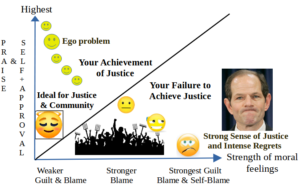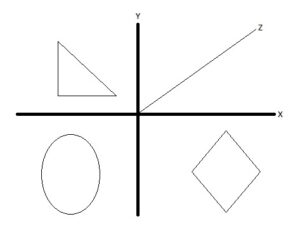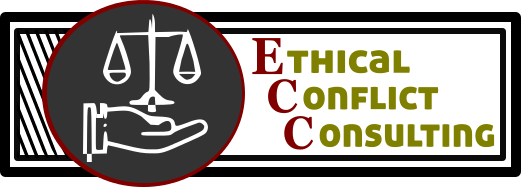In what forms are morality and ethics real?
For each moment of our lives, you and I are faced with the question about what we should do. What should we do now? Each new situation brings this question up again and again. With each step we make in life, this question about morals needs to be answered anew. The question is intensified and demands answers at expected and unexpected times.
No power can remove us from the need to answer what it is that we ought to do in each coming moment. This is an awe-inspiring responsibility that each of us have as moral agents.
We each have moral responsibility as social creatures since we are intelligent enough to think about what the future consequences of our actions will be. All of us have moral responsibility because we know what the consequences of our inaction is, too.
Where there is a will, there is also a path, and the direction we choose at each moment can be morally good or evil. If it is evil, we face our own personal feelings of guilt, regret and self-blame, and we risk the blame and punishment from others each time we act with an ill will.
Good Wills are Necessary for Societies to Continue
When we misbehave with ill wills, we also risk spoiling the wills of others so that they act with ill wills in return or towards others. The impact of ill wills can certainly cripple any social group. An ill will can tear apart a social group, such as a group of co-workers or a family.
Because the impact of ill wills can certainly cripple any social group, and because social groups with ill wills can cripple other social groups, a multiplying impact can lead to the rot and lawlessness of entire nations.
For these reasons, morality and the cultivation of good wills is necessary for collaborating. Collaborating is the superior way of managing conflict so that all of the parties involved can benefit from the interaction (See Conflict Management).
Cultivating good wills leads to sharing. Sharing is necessary for individuals to establish a strong social group with cohesion, a long-lasting one that overcomes obstacles from within itself and from outside the group.
Acting with the Good Will Determines Our Sanity
Nobody is perfect with respect to their decision-making. Also, no reasonable person can expect another to be a perfect decision-maker in life.
Of course, mistakes happen, and, in such cases, one may have acted with a good will but also face the consequences that appear as if they came from an ill will instead. People may perceive one’s error as if one has bad intentions.
However, if the unwanted consequences happened because of some error that is made, one can learn from such mistakes and relieve the self-blame and feelings of guilt. For these sorts of reasons, as the relief of self-blame and guilt, we act ethically.

Fig. 1 The ethical dimensions of height (high or low praise) and strength (weak or strong guilt)
We act ethically in order to contribute to the continuation of societies. Fundamentally, societies exist on the basis of collaboration, cooperation, sharing, trust and other moral values. Without the moral values, there can be no society.
Those who kill and destroy and seek pleasures in life, without the need to do all of that, live immoral and insane lives without purpose. They live according to a sick notion of self-love, and they do not realize that collaboration, cooperation, sharing, trust and other moral values are beneficial to the self for allowing the possibility of happiness. So, when they act unethically, they make it impossible for themselves to be happy. Their self-hate is disguised for them as being self-love.
In short, we act ethically because the alternatives result in the deterioration of our communities and society. We act ethically so that we do not go insane with an ill will with which most of us cannot tolerate living. Happiness is not possible if we, as decision-makers in each moment, continue to make decisions with ill wills, which gives us a GREAT reason why we act to form habits, like good deeds with the good will.
Of course, there are people with extreme mental disorders, and sometimes, unfortunately for the rest of us, they are very intelligent and use their skills and natural abilities to deceive many people.
Undoubtedly, when we act in good faith, or with the good will, and the consequences are desirable, we experience self-praise and may even be praised with thanks and appreciation from others. These types of moments are genuine and sincere in our interactions. Inevitably, this is the ideal set of circumstances which we would all prefer to wake up remembering the next day.
In essence, morals, moral values and ethics are real, and we each have moral responsibility that arises again with each new moment. Of course, some may try to dispute these facts, but it is often a redundant attempt to escape from moral duties one has to oneself, others and the world. The reason that such a dispute is a redundant attempt is that oftentimes we are inclined to act or take inaction when our moral responsibilities require the opposite. However, if we fail to achieve our own moral standard, then we will suffer greatly from self-guilt.
Another point of dispute, concerning the objectivity of morality, is made by those who have dull senses of values, especially moral values. For example, the librarian may not ever respect the moral value of courage until she has a conversation with another librarian whose life was saved by a courageous fire fighter and whose co-workers were able to save thousands of books by extinguishing the fire.

Fig. 2 Firefighters materialize real courage when they use their wisdom and self-control out of duty
Some careers require achieving the moral values frequently, and those who cannot do so are fired.
It is worthy to realize that we can learn about moral values by sharing and exchanging ideas. For instance, the librarian who reads voraciously may well respect the moral value of courage she learned from her readings.
The stronger the moral value is, and the higher the priority of the moral value is, the stronger the feelings of guilt and self-blame when one fails to meet his or her own moral values or breaks them. Moreover, if another or several others realize that you act immorally, breaking a moral value, or if you fail to act morally via inaction, then the blame they give you can make life less tolerable for you.
In short, fulfilling moral values with the good will makes happiness a possibility for you in life, and failing to fulfill moral values and acting with an ill will causes you to suffer greatly with a rotting will. However, the rotting will can be salvaged, though we cannot change the past, but with the moral values of forgiveness, trust and atonement, replacing the ill will with the good will, the will is able to work itself back toward the possibility of happiness in life. For all these reasons, we continue to teach and learn ethics and try our best to live moral lives with worthy moral values for the situations that arise.
EXAMPLES OF MORAL VALUES: Moral values, such as courage, trust and generosity, really exist at certain times and places. Moreover, most of us, if not all of us, have experienced them in reality, even if the characters of our dreams perform courageous acts, display trust and generosity in closer to ideal ways than when we ever experienced them happening during waking life.
The moral value of courage exists, and this is obvious to us who know the history of cities saved from burning by the courageous workers, in which case the moral value is priceless to us all. With shapes, such as circles and triangles and pyramids, the ideal ones with “perfect” measurements do not exist in life or in reality, but they do exist in ideal space. Ideal space is something that we can know about with coordinates, like the Cartesian coordinates, and as with moral values, such as courage in real life, they are also not ideal with perfect performances of people with good wills who complete them, but they do exist in ideal space as well as real space.

Fig. 3 The Egyptian pyramids
Any dispute regarding the forms of real moral values are generally mistaking the moral values in ideal space, applying “perfect” measurements, for the moral values in real space, which is a fallacy. There is an error in the reasoning for the application that comes from mistaking ideal space and its laws, rules or limitations for real space with its laws, rules and limitations.
Mistaking things in real space for things in ideal space is like the error of someone measuring the perfect pyramid in math class at school on a graph where the shape appears to have perfect triangles, and then the person travels to Egypt, Sudan, Guatemala and Mexico to measure the pyramids constructed by some of our ancient ancestors and determines that since they lack the perfect triangles as measurements, they are not really pyramids. However, they are real pyramids, even though they are imperfect ones, and moral values exist in life, although they can only be experienced by us in their real forms rather than their ideal forms.

Fig. 4 Shapes that are considered ideal or perfect (i.e., geometrical shapes)
In each of these cases with pyramids and moral values, the real ones overlap with the ideal ones. This is where ideal space and real space unify. In fact, sometimes the real moral values, such as courage, can overshadow the moral values in ideal space because they appear to be absolutely perfect, and we can remember them in that way.
During each of our lives there is always one event that we remember where the moral value has been fulfilled in a way that is closest to the ideal. When lives are saved by generosity and courage, for example, some humans consciously experience and remember, from time to time, until their deaths that seemingly perfect moral values were achieved by real heroes in real workplaces, too.
Acting Discovering Moral Values: The importance of your own knowledge of ethics
Why Is ethical knowledge most important to you? There are three main tendencies toward gaining knowledge from the study of ethics.
(1) Knowledge of ethics informs you about the way the world is in a way that is relevant to your life.
(2) Knowledge of ethics informs you of the way the world should be, according to your own values.
(3) Knowledge of ethics reveals to you what you should do and not do to make the world the way it should be as is consistent with your own values and moral demands on yourself.
(1), (2) and (3) are never complete forms of knowledge. They never can be. However, they do suffice to make each of us morally responsible to ourselves and to others. You are the one who needs to discover your own moral values through your own conscious experiences, and your moral values differ from those of others to some extent.
When knowledge of ethics comes to us, we realize the way the world is and the way the world ought to be. Also, there is a demanding and commanding aspect of moral life that we each place upon ourselves, and, at once, it makes us each realize what we ought to do so that we can better live with ourselves as the deciders.
We each develop a moral sense. Our knowledge of ethics is attained through our moral senses. Each of us feel some intensity of self-blame and guilt for breaking or failing to meet our own demands and commands for action and inaction.
As each of our life spans shorten with the passage of time, these actions and inaction that we make and feel morally guilty for are some of the moments that we dwell and ruminate on for years and decades to come. For these reasons, we understand that we have these moral feelings, and we act morally because we do not want to experience them yet again since that could even change who we think we are. These are the issue of change from good to evil, right to wrong, innocent to guilty.
Such moral feelings that you have are just one dimension of what your moral sense causes you to understand about moral life. Of course, some person may have a duller moral sense than you or I have. Some are more vivid, though, and they can show this through action as they experience moral life with greater clarity.
You and I discover our very own moral values. These values we discover are infinitely important to us all as they come from each of us as their source.
Moral values come to your moral sense and consciousness and play necessary roles on you imposing your own personal moral demands on yourself. These values can be shared by you with others. Your own moral values are shared with many of our ancestors and many people across the planet right now who have and will come to have these very same values as a High priority just like you have. So, make no mistake. The moral values are not new phenomena, although some may need to be discovered anew.
Moral values are infinitely valuable to each of us because they make happiness possible for each of us. Happiness becomes a possibility for you when you follow your own moral demands in good faith by taking action or inaction with a good will. You take action or inaction with a good heart and CAN then be happy.
Without the fulfillment of your own personal moral values, you cannot achieve happiness. Thus, the discovery of your own moral values is of the utmost importance to you, your family and those around you. Again and again, they make society possible through sharing, cooperation and collaboration.
Citation: Brant, William Allen. (2022). “In what forms are morality and ethics real?” Ethical Conflict Consulting. September edition. https://ethicalconflictconsulting.com/ethics/
